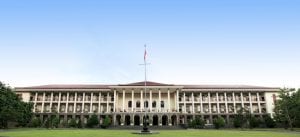
BACKGROUND
Starting with the idea to strengthen the social science community within Universitas Gadjah Mada (UGM), the International Symposium on Social Science was held in 2018 by the Center for Southeast Asian Social Study (CESASS) UGM to answer the concerns of social science relevancies on this era. Two years have passed, the thoughts and time all the academicians dedicated in our symposium wrapped up in the special edition of IKAT Journal Vol 2, No. 2 in 2019 and a book titled “Social Science in the Age of Transformation and Disruption: Its Relevance, Role, and Challenge.”
As a biennial event, CESASS UGM will return this year with Symposium on Social Science (SOSS) 2020: Rethinking the Social World in the 21st Century.
On the other hand, as the previous symposium focused on the relevance of social science in general. This year Center for Social Studies in Southeast Asia (CESASS) UGM wants to emphasize “How social science became the answer in regards to the social phenomenon in the 21st century?”
As the only center of excellence or Pusat Unggulan Iptek (PUI) in the social and humanities fields acknowledge by the Indonesia Ministry of Higher Education. CESASS UGM has this responsibility to raise social science as the answer to social phenomenons that happens in this 21st century. As technology provides and possesses more types of interaction for humans as a social creature, currently, social sciences should have the urgency to understand human interaction within the digital realms deeply. While some academicians were still focusing and revolve around the ‘old’ methods in which started to become irrelevant, especially with the current circumstances in society, we need to do further to understand modern society these days. In other words, the challenges of declining relevancies of nowadays social sciences were no longer from outside of the sciences itself; but it is within.
The future of social science in Southeast Asia now on the beholder of young academicians who are aware of and understand the social phenomenon of their society. Hence, the future of social sciences in Southeast Asia and the study about its society, shall and will rely on the academicians who understand the structure existed in the society, social dynamics, and social interactions in Southeast Asia.
PURPOSES
Certain issues on social inequality, multiculturalism, practical political marginality, global and regional power relations, Indonesian workers, ASEAN, social issues on disaster management; those issues were in an urgent for social sciences academicians to not just understand, but also identifying and give out their suggestion or even policy recommendations, addressed to the beholder of the policies. CESASS was expecting the discussion outcomes on the discussion panel on the symposium shall be beneficial to answer and eradicate the social phenomena in Southeast Asia. CESASS hopes that the SOSS 2020 will strengthen Universitas Gadjah Mada as a prestigious higher institution that is capable of becoming the initiator to voiced out the urgency of social sciences in terms of facing the Industrial Revolution 4.0.
SUB THEMES
- Social science and power
- Social science, ICT Revolution, and the Future of Humanity
- The future of social science in Southeast Asia
- Methodological challenges in Social Science
- Critical Perspective in Social Science
- Ecological disaster and climate change
- Law, technology, and society
- Women and Human right issues
- Population, economic development, and future mobility
- Religion and multiculturalism
- Communication and media in the digital era
- Films and Social Change
